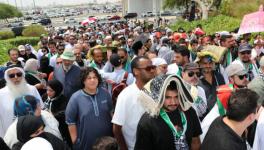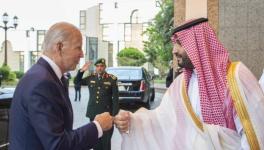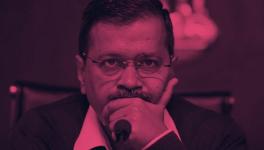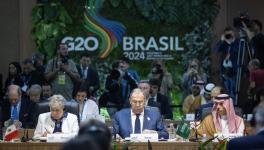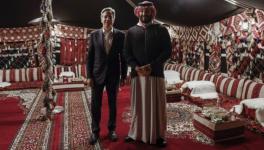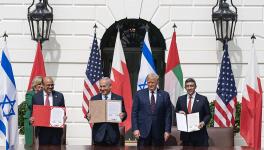LGBTQ Communities Facing New Repression in Middle East
Observers say there's an unusually intense crackdown on LGBTQ+ communities in the Middle East at the moment
Most of the people around him don't know he identifies as queer, the 20-year-old Iraqi student told DW. But life in his comparatively conservative southern city of Najaf is dangerous for him anyway.
"Once I wore a pink shirt and I was harassed, just because of the color," said Haiden, whose full name cannot be published for his safety. "Sometimes people are harassed and even killed just because they don't look like everyone else."
And, he said, things are getting worse for LGBTQ communities in Iraq. "We're already exposed to all kinds of harassment and attacked on a daily basis," he said. "And that's even before this law to criminalize homosexuality has been enacted."
'Severe penalties'
In July, Iraq's government announced that it was planning a law prohibiting homosexuality. Iraq is one of three Arab-majority countries in the Middle East that doesn't explicitly criminalize same-sex relationships. The others are Jordan and Bahrain.
If the law is passed, it would bring Iraq into line with the rest of the region. Most other Middle Eastern nations outlaw same-sex intimacy more directly, punishing it with anything from fines to prison to, in Saudi Arabia, the death penalty.
"The new law will hold homosexuals to account and impose the most severe penalties on them," Aref al-Hamami, a member of parliament who sits on the parliamentary legal committee, told DW.
The law is yet to be voted on but al-Hamami said he believed that it would pass, despite criticism from domestic and international human rights organizations.
"We are a Muslim country," he said. "We have customs and traditions — and Islam forbids these actions."
Legacy of colonialism
This argument — that same-sex relationships are not part of Middle Eastern culture — is one that is often used by those opposed to them. But it is also wrong.
Just like the Bible, the Koran mentions homosexuality several times in a disapproving way. But, despite religious condemnation, same-sex relationships featured regularly in poetry and art in the Islamic world.
Shortly after Pride events were canceled by Lebanese authorities in June, a related billboard in Beirut was also destroyed
In Iraq, for example, the eighth century poet Abu Nawas is celebrated with a statue in central Baghdad. Abu Nawas was an infamous libertine, who penned paeans to such things as the delights of the local bathhouse, or hammam, where he could observe handsome men naked — at least "until the towel bearers come in and spoil the fun."
Some researchers maintain that, for centuries, Arab culture was more permissive about same-sex relationships than European culture.
"Pre-modern Arab-Islamic thought … had no term for the concept of homosexuality as understood today," Sultan Alamer, a visiting fellow at the Center for Middle Eastern Studies at Harvard University, wrote in an essay published in New Lines magazine in June.
This changed in the late 19th and early 20th centuries. The Victorian era popularized the idea that sexual pleasure was sinful or shameful, and in 1885 the British brought in some of the first laws to criminalize sex between men.
Arabs began increasingly to adopt conservative European attitudes. Alamer describes how one Arab visitor to Paris in the early 19th century praised the French for "not being inclined toward loving male youths and eulogizing them in poetry.”
Previously acceptable ideas about homosexual desire and poems about male beauty would come to be considered uncivilized.
Some of the first laws against homosexuality in the Middle East were actually imported because European legal systems were also used in European colonies.
According to British legal advocacy organization, the Human Dignity Trust, most of the modern laws against homosexuality in the Arab world are based on religion. However even today some of those still have their roots in historical British law. This is true of Sudan and Egypt — the former colonies simply kept those old rules when they became independent.
Culture wars
Same-sex relations have become a "cultural battleground," Katerina Dalacoura, a professor of international relations at the London School of Economics, wrote in a paper published in The Third World Quarterly.
"The identification of heterosexuality with cultural authenticity in Middle Eastern societies is a distortion of the historical record," she argued.
According to Dalacoura, authoritarian governments and religious fundamentalists stoke public sentiment against LGBTQ communities to secure their power. "Their authority is shored up by the call to protect an 'authentic' culture which, if it ever existed, has long ago been wiped out," she wrote.
The situation seems to be getting worse for LGBTQ communities in many Middle Eastern countries. "Right now, the entire region seems to be seeing a plethora of homophobia and transphobia," said Andrew Delatolla, a lecturer in Middle Eastern studies at Leeds University in the UK, whose research centers on race, gender and sexuality.
This includes the Saudi government's campaign to remove rainbow-colored toys from shelves, a state clampdown and threats from a militant Christian group directed at LGBTQ communities in Lebanon, and a hashtag campaign that originated in Egypt recently that uses "fetrah," the Arabic word for "instinct," to insist that there can only be two genders.
"It's not something I've seen emerge in quite this way before, and I think part of the reason why is that there have been so many advances in the way that society has been thinking about sexuality in general, and queerness in particular," Delatolla said. "For a lot of socially conservative individuals, that poses a threat to the moral values they rely on for maneuvering through society and the state."
Political tactics
In New Lines magazine, Alamer concluded that authoritarian Arab leaders often substitute "moral authority" for "democratic legitimacy."
"In the past five decades, this moral authority was exercised through regulating religion and subjugating Arab women," he wrote. "If you are an Arab dictator and want moral legitimacy, but you do not want to derive it from Islam or gender, what is the most convenient source that fits your new secular, conservative agenda? Arguably, the answer is adopting anti-homosexuality and, to a lesser degree, anti-atheism discourse."
Prominent Iraqi cleric Muqtada al-Sadr said same-sex marriage caused the pandemic
This appears to be behind what is happening in Iraq too, activists say. "Politicians who have failed to manage the state's affairs are distracting people with laws that have a big impact on the street," said Sam, a consultant who works with IraQueer, which describes itself as Iraq's first national LGBTQ organization.
There are other recent examples of similarly attention-getting laws in Iraq, on pornography and paternal custody, as well as against normalizing relations with Israel, said Sam, who asked that his full name not be used.
"Iraq lives under the shadow of a political class that's failed to form a government and which is trying to cover up its own corruption," Sam said. "It does so by deluding people that these laws preserve Islamic principles."
Azhar Al-Rubaie contributed reporting from Iraq.
Get the latest reports & analysis with people's perspective on Protests, movements & deep analytical videos, discussions of the current affairs in your Telegram app. Subscribe to NewsClick's Telegram channel & get Real-Time updates on stories, as they get published on our website.












